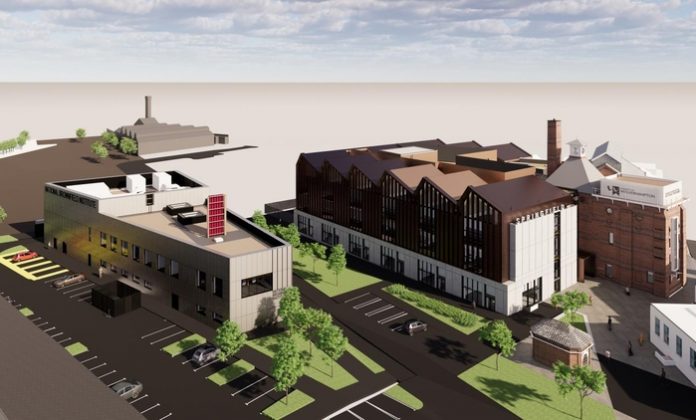
The University of Wolverhampton has appointed a main build contractor for the ‘shovel ready’ National Brownfield Institute (NBI) at its £120m Springfield Campus.
ISG has been awarded the contract to build the NBI on the construction super campus, with work starting later this month.
The £17.5million research centre, designed by Birmingham-based Associated Architects, received planning approval in December 2020.
The NBI will be a world-class institute that provides the facility to develop modern methods of building through innovation and partnership with the construction industry, focusing on the practical application of future brownfield regeneration through the work of research teams, leading policy development and commercial services.
The scheme has benefited from £14.9million of funding from the Government’s Get Building Fund for the West Midlands. City of Wolverhampton Council worked closely with the Black Country LEP and West Midlands Combined Authority to secure the funding. A request for the remainder of the funding required forms part of the city’s bid to the Government’s Towns Fund.
The NBI will secure the City of Wolverhampton’s position as a leader internationally in sustainable construction, circular economy and brownfield development and will deliver new skills, jobs and opportunities for local people in the city, which has been hit hard by the pandemic.
Professor Geoff Layer, Vice-Chancellor at the University, said: “We’re delighted to announce the appointment of ISG as contractor for the NBI meaning that we are a step closer to delivering the project and adding to the portfolio of construction and built environment expertise that now resides at the Springfield Campus.
“The NBI will be integral to the way we look at land remediation and regeneration across the Black Country and the UK and will play a pivotal part in unlocking industrial land to help tackle the housing shortage in our towns and cities.”
Councillor Stephen Simkins, City of Wolverhampton Council Cabinet Member for City Economy, said: “We have seen the University’s Springfield Campus blossom into the reality of a European-leading built environment education campus and we are delighted to have got to the point of delivering the National Brownfield Institute so quickly after securing vital funding.
“It will make Wolverhampton a world leader in construction, regeneration and built environment, offering teaching and skills development, cutting edge research and innovation, and enterprise and business engagement through multi-sector partnerships.
“It is yet another sign of the confidence being shown in Wolverhampton as a place to invest, as our regeneration plans change our city and help it recover and relight from the impact of the Covid-19 pandemic, providing new skills and jobs opportunities for people in the city.”
Tom Westley DL, Chair of the Black Country LEP Board, said: “The Black Country LEP is delighted to support projects such as these which are making a real positive impact on the local economy, creating jobs and supporting skills development, as our region looks to recover from the impact of the pandemic.”
Andy Street, the Mayor of the West Midlands and Chair of the WMCA, added: “This Institute will help the West Midlands become a global leader in the clean-up and regeneration of derelict sites.
“That’s important for several reasons not least because every brownfield site we develop saves a greenfield one. But it will also drive next generation thinking and the development of new techniques for transforming brownfield land into vibrant new communities offering affordable and energy efficient homes for local people and modern commercial premises for growing businesses.
“The Institute will also equip our residents with the modern construction skills they will need to work on these brownfield projects, helping to get people into high-skilled, well-paid, work as we look to bounce back from the economic impact of the pandemic.”
Wayne Flannery, ISG’s regional director, said: “Helping to deliver on the city’s vision for a dedicated centre of excellence for construction and built environment learning has been highly motivating for our team. It’s inspiring to work collaboratively with a customer so focused on creating the very best facilities for students and academics to excel in groundbreaking research that could potentially change the way we approach construction in the future.”
Steve Lamb, Head of Capital Developments at the University, said: “The project team has worked incredibly hard to get the project moving with thanks to Associate Architects, CPW, Faithful & Gould, Delta Planning, Atkins and MACE for all of their efforts in getting the project to this point so quickly.”
The 12-acre Springfield Campus is already home to the Thomas Telford University Technical College, Elite Centre for Manufacturing Skills and the recently opened £45million School of Architecture and Built Environment.
These facilities, combined with the NBI, will lay the foundation for the delivery of a National Centre for Sustainable Construction and Circular Economy, which will focus on sustainability and the climate change emergency.


















